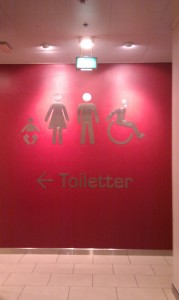The Plural Plurals of Danish Posted by Bjørn A. Bojesen on Jun 30, 2011 in Grammar
Let’s break away from the outer world of danskhed (Danishness), and take a look at an essential part of any grammar: plurals. It’s inevitable that you’ll sooner or later want to refer to more than one of the same thing. The same can be said of this blog, where I cannot let every guest-starring Danish noun appear as a lone wolf… (Remember all those bål on Sankthans?)
Basically, Danish plurals, just like English ones, are made by adding an ending to the basic or singular form. (There may be other changes occurring to the word as well, but we’ll cover that later on.) Unlike English, however, modern Danish has several endings:
-ER
This is this is the king of Danish pluralizers. Most new words take this ending. When in doubt, add -er!
Some common nouns in this category include:
uge > uger ’week(s)’
sky > skyer ’cloud(s)’
menneske > mennesker ’human(s)’
træ > træer ’tree(s)’
bil > biler ’car(s)’
kvinde > kvinder ’woman/women’
pige > piger ’girl(s)’
ven > venner ’friend(s)’
(As you can see, a final ”-e” is merged into the ending. Also, the ending may cause a final consonant to be reduplicated in writing, as in the last example.)
-E
As a close second comes -e. Among the words in this category are the words already ending in -er (wouldn’t ”-erer” look awkward?)
dag > dage ’day(s)’
hest > heste ’horse(s)’
hund > hunde ’dog(s)’
dreng > drenge ’boy(s)’
dansker > danskere ’Dane(s)’
computer > computere ’computer(s)’
NO ENDING
A handful of very common words take no ending at all in the plural – just like ”one sheep – many sheep” in English.
år > år ’year(s)’
får > får ’sheep’
ord > ord ’word(s)’
bål > bål ’bonfire(s)’
kys > kys ’kiss(es)’
knus > knus ’hug(s)’
Unfortunately, there are no handy rules telling you which ending to choose. (Those familiar with Icelandic, Faroese or Nynorsk Norwegian may note that there is a certain correspondence between –ar plurals in those languages and –e plurals in Danish – Icelanders, Faroe Islanders and Norwegians say dagar and hestar.) Unless you are an expert in language history, the best thing you can do is simply to always note the plural ending of a word! 🙂
Last but not least, the pesky little ending
-S
is sneaking into the Danish language, mostly through English (and some Spanish) loan-words:
joke > jokes
mail > mails
band > bands
tortilla > tortillas
While not every Dane approves of this novelty, most younger Danes seem to have adopted it playfully and made it part of their expressive repertoire.

Build vocabulary, practice pronunciation, and more with Transparent Language Online. Available anytime, anywhere, on any device.
About the Author: Bjørn A. Bojesen
I was born in Denmark, but spent large parts of my childhood and study years in Norway. I later returned to Denmark, where I finished my MA in Scandinavian Studies. Having relatives in Sweden as well, I feel very Scandinavian! I enjoy reading and travelling, and sharing stories with you! You’re always welcome to share your thoughts with me and the other readers.





Comments:
Marketta Flodman:
I really like this weblog, excellent content material and I am going to bookmark this web site for future updates.
Bjørn A. Bojesen:
@Marketta Flodman Thanks, Marketta! Glad you like the blog. 🙂
Rob:
I really like your blog too. I have learned Swedish and can read most of the Scandie languages, but Danish is the one that spelling and speaking seem so far apart. Recently i watched Babette’s Feast again for the 1000th time (one of all time favs) – and it was cool to listen to Danish with a French accent. Anyway, great site. Keep on posting cool things about Danish! tusind tak!
ps. also if you ever have any cool food ideas for my site and FB page – let me know. I love writing about food and language…
Bjørn A. Bojesen:
@Rob Thank you for the nice words! Nice to get some feedback from a fellow blogger.
How about writing about Nordic food? There’s a famous restaurant in Copenhagen: Noma.
I’d be happy to help you with some words.